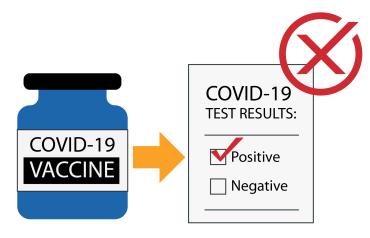Vaccine myths
-
Fact: Vaccination protects you from getting seriously ill and dying from COVID-19. For the first fourteen days after getting a vaccination, you do not have significant levels of protection. For a single-dose vaccine, immunity will generally occur two weeks after vaccination. For two-dose vaccines, both doses are needed to achieve immunity. While a COVID-19 vaccine will protect you from severe illness and death, the extent to which it keeps you from being infected and passing the virus on to others is unknown. However, preliminary data suggests there are protective effects. To help keep others safe, continue to maintain at least a 1-2 meter distance from others, cover a cough or sneeze in your elbow, clean your hands frequently and wear a mask, particularly in enclosed, crowded or poorly ventilated spaces. Always follow guidance from local authorities based on the situation and risk where you live.
-
Fact: Even if you have already had COVID-19, WHO recommends that individuals be vaccinated. The protection that someone gains from having COVID-19 will vary from person to person. It is also unknown how long natural immunity might last. Those who have previously had COVID-19 infection should still receive COVID-19 vaccination².
-
Fact: COVID-19 vaccines produce protection against the disease due to developing an immune response to the SARS-Cov-2 virus. Developing immunity through vaccination means a reduced risk of developing the illness and its consequences. This immunity helps you fight the virus if exposed. Getting vaccinated may also protect people around you. If you are protected from getting infected and from disease, you are less likely to infect someone else. This is particularly important to protect people at increased risk for severe illness from COVID-19, such as healthcare providers, older or elderly adults, and people with other medical conditions².
Furthermore, there is no indicator to detect whether your immunity is strong or weak. Therefore, it is advised to get vaccinated rather than rely on "high" immunity.
-
Fact: Vaccines allow your body to build immunity without the damaging effects the actual diseases can have. COVID-19 can cause severe complications and can be deadly. There are no specific treatments for COVID-19. It is far wiser to avoid the risk².
Recent evidence suggests that those who have been vaccinated are better protected against the Delta than those who have this immunity after COVID-19.
-
Fact: While several COVID-19 vaccines appear to have high levels of efficacy, no vaccine is 100% protective. As a result, a small percentage of people may not develop protection after the COVID-19 vaccination. In addition to vaccine-specific characteristics, several factors such as a person's age, their underlying health conditions, or previous exposure to COVID-19 may impact a vaccine's effectiveness. It is also not yet known how long immunity from different COVID-19 vaccines will last. That is one reason why, even after vaccination, we must continue using all public health measures that work, such as physical distancing, masks, and handwashing².
As the country's epidemiological situation improves, preventive actions to protect health safety will progressively begin to drop. For example, when 70-75 percent of the population has been vaccinated, this occurs typically. -
Fact: WHO has stated that, like any vaccine, COVID-19 vaccines can cause mild side effects, such as a low-grade fever or pain or redness at the injection site. [Most reactions to vaccines are mild and go away within a few days on their own. More severe or long-lasting side effects to vaccines are possible but rare]. Vaccine side effects are continually monitored by local authorities to detect rare adverse events. Reported side effects to COVID-19 vaccines have mostly been mild to moderate and short-lasting. Additional side effects include fatigue, headache, muscle pain, chills, and diarrhea. The chances of these side effects following vaccination differ according to the specific COVID-19 vaccine. ²
Vaccine side effects are completely unnecessary. There may be no side effects from the vaccine, but that does not indicate it was useless.
-
Fact: No. ² If such a methodology guides us, humanity has been using vaccines to combat contagious diseases for almost two centuries, indicating that everyone should have been "chipped" long ago.
-
Fact: COVID-19 vaccines were created utilizing well-known and well-proven vaccine production technologies. This justifies the rapidity with which vaccines are developed. There are strict protocols in place to help ensure the safety of all COVID-19 vaccines. Before receiving validation from WHO and national regulatory agencies, COVID-19 vaccines must undergo rigorous testing in clinical trials to prove that they meet internationally agreed benchmarks for safety and effectiveness.
The unprecedented scientific collaboration allowed COVID-19 vaccine research, development, and authorizations to be completed in record time – to meet the urgent need for COVID-19 vaccines while maintaining high safety standards. As with all vaccines, WHO and regulatory authorities will continuously monitor the use of COVID-19 vaccines to confirm that they remain safe for all who receive them. -
Fact: The WHO Global Advisory Committee on Vaccine Safety (WHO GACVS) has found that the AstraZeneca COVID-19 vaccine (Vaxzevria and Covishield) effectively prevents COVID-19 severe infections that can cause hospitalization and death. The most common side effects from the vaccine are mild to moderate that usually resolve in a few days. The most severe side effects are rare but can cause blood clots with low platelets. Following studies, it was discovered that the same issues could occur in non-vaccinated people, implying that blood clots were linked to the AstraZeneca vaccine.
The WHO GACVS has also stated that the benefits of vaccination are far greater than the risk of the rare side effect. In addition to the benefits in preventing severe disease and death due to COVID-19, the vaccine offers protection against overall COVID-19 and complications from 'long COVID' and death, potential protection for close contacts and the community by preventing transmission, and a risk reduction of severe disease from some variant strains of the virus. (Source: WHO Global Advisory Committee on Vaccine Safety (GACVS) and Interim statement of the COVID-19 subcommittee of the WHO Global Advisory Committee on Vaccine Safety on AstraZeneca COVID-19 vaccine). -
Fact: While the ingredients in the labels of vaccines can look intimidating, they are usually found naturally in the body, the food we eat, and the environment around us - for example, tuna.
The amounts in vaccines are minimal. Additionally, vaccines are tested and go through rigorous and lengthy scientific trials and certification processes with WHO and national regulatory agencies to ensure that they are safe and effective.
-
Fact: COVID-19 vaccines do not cause COVID-19 infection. Vaccines teach our immune system to recognize and fight the virus that causes COVID-19. Sometimes this process can cause symptoms, such as fever. Typical side effects include pain at the injection site, fever, fatigue, headache, muscle pain, chills, and diarrhea. These symptoms are typical signs that the body is building protection against the virus that causes COVID-19. It typically takes a few weeks for the body to build immunity (protection against the virus that causes COVID-19) after vaccination. That means it's possible a person could be infected with the virus that causes COVID-19 just before or just after vaccination and still gets sick. This is because the vaccine has not had enough time to provide protection. If symptoms are persistent and prolonged, they should not be attributed to COVID-19 vaccine side effects, and testing for COVID-19 should occur. ²
14 days after receiving the second dose of the vaccine, a person is considered fully immunized.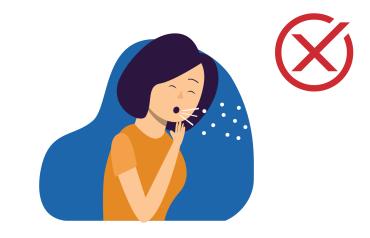
-
Fact: WHO has stated that if you are trying to become pregnant now or want to get pregnant in the future, you may get a COVID-19 vaccine when one is available to you. There is currently no evidence that COVID-19 vaccination causes any problems with pregnancy, including the development of the placenta.
In addition, there is no evidence that fertility problems are a side effect of any vaccine, including COVID-19 vaccines. Like all vaccines, scientists are studying COVID-19 vaccines carefully for side effects now. They will continue to study them for many years.
(Source: WHO: Vaccines Safety) Of course, you should always consult your doctor when making these decisions.
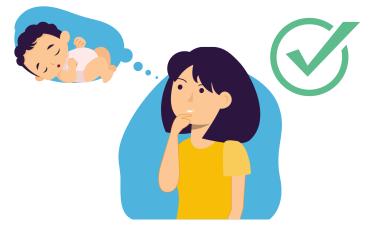
-
Fact: No. Vaccine shedding is the term used to describe the release or discharge of any vaccine components in or outside the body. Vaccine shedding can only occur when a vaccine contains a weakened version of the virus. None of the Covid-19 vaccines have a live virus. mRNA and viral vector vaccines are the two types of currently authorized COVID-19 vaccines available.
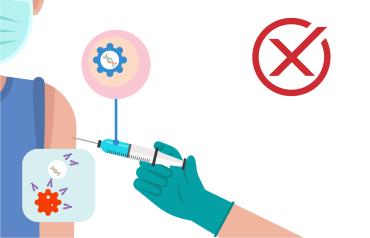
-
Fact: No. Receiving a COVID-19 vaccine will not make you magnetic, including at the vaccination site, which is usually your arm. COVID-19 vaccines do not contain ingredients that can produce an electromagnetic field at the site of your injection. All COVID-19 vaccines are free from metals.
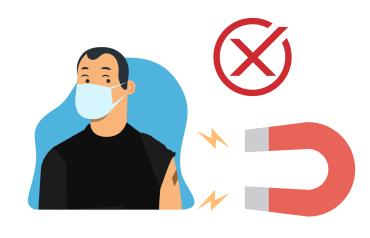
-
Fact: COVID-19 vaccination will protect most people from getting sick with COVID-19. A small percentage of fully vaccinated people will still get COVID-19 if exposed to the COVID-19 virus. These are called vaccine breakthrough cases. Some people might not experience any symptoms, and some could become sick due to COVID-19.
However, vaccination might make the illness less severe. If you are fully vaccinated, the overall risk of hospitalization and death due to COVID-19 is much lower than among unvaccinated people with similar risk factors. -
Visit the How to Protect Yourself & Others page to learn about how to protect yourself from respiratory illnesses, like COVID-19.
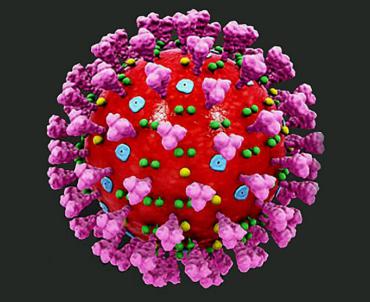
-
Fact: No. None of the authorized and recommended COVID-19 vaccines cause you to test positive on viral tests, which are used to see if you have a current infection.
Suppose your body develops an immune response to vaccination, which is the goal. In that case, you may test positive on some antibody tests. Antibody tests indicate you had a previous infection and that you may have some level of protection against the virus³.
